Key Points
- Playing is good for so many things. For building confidence, learning how the world works, developing communication skills and empathy as well as helping them to feel happy, safe and loved. So much of what your child will learn through life is built on play
- When you’re thinking about which games to play with your children, you should consider their developmental stage as well as the skills that you want to target
- Unstructured play is child led, whereas structured play is often led by a parent or educator
On this page
Fun Play Ideas and Games for Children
What To Do If Your Child Doesn’t Want To Play Games
Everyday is a fun adventure at Gowrie NSW
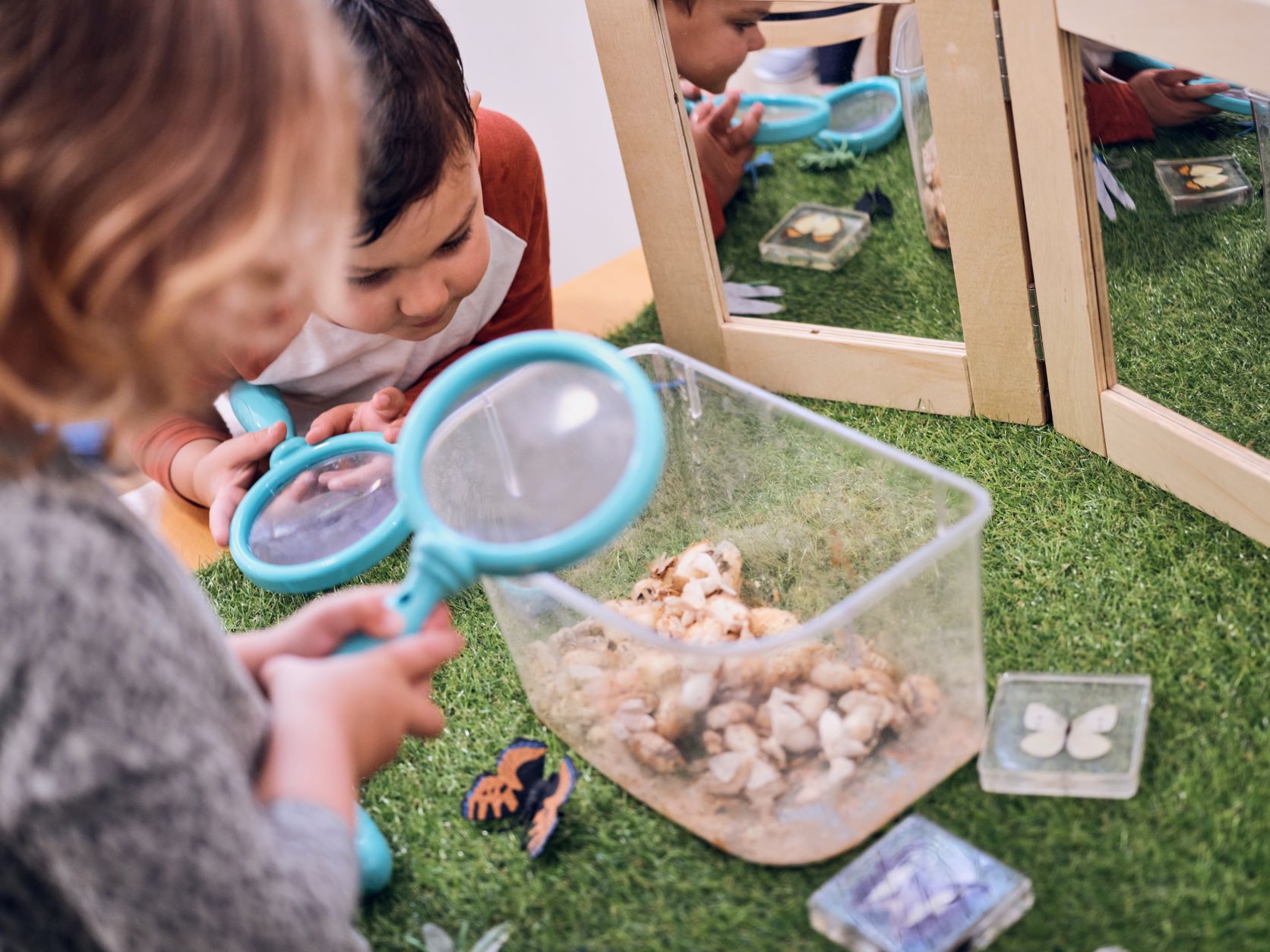 Play isn’t just about having fun. It’s also how children learn. What may seem like a simple game of peekaboo is actually helping your child to develop their social skills. And that obstacle course you put together in the backyard? That isn’t just wearing your toddler out before bedtime. It’s also helping to develop their gross motor skills.
Play isn’t just about having fun. It’s also how children learn. What may seem like a simple game of peekaboo is actually helping your child to develop their social skills. And that obstacle course you put together in the backyard? That isn’t just wearing your toddler out before bedtime. It’s also helping to develop their gross motor skills.
Playing is good for so many things. For building confidence, learning how the world works, developing communication skills and empathy as well as helping them to feel happy, safe and loved.
So much of what your child will learn through life is built on play. We’re going to dive deep into all things play to help you lay a solid foundation.
The Benefits of Play
How do you learn problem solving? Or emotional resilience? Or critical thinking?
You play.
As adults, we take these skills for granted. But chances are, you learned these skills through the games you played as a child.
There are social, physical, cognitive and emotional benefits to play. These include:
- Understanding cause and effect
- Exploring the world and the role we each play within it
- Developing creativity and imagination
- Enhancing critical thinking skills
- Developing both fine and gross motor skills as well as balance and dexterity
- Building spatial awareness and motor planning skills
- Learning how to interact with peers and educators/parents
- Developing emotional resilience and learning how to lose
Different Types of Play
Play is play, right? Not quite. There are different types of play that are broadly categorised as unstructured and structured.
Unstructured Play
Any toddler parent will be very familiar with unstructured play. This is the type of play that’s not planned. It’s not set around a particular game or activity. It just happens.
Unstructured play is child led. An activity will spark their interest and they will go with it.
This is an important type of play because it allows them to explore their interests and use their imagination in a safe way. When the play is led by the child, it also allows them to go at their own pace. They are almost defining the rules as they go and able to take their time as they practice or master a skill.
What does unstructured play look like? It could be playing make dress ups or make believe, exploring an area of the house or backyard, making a blanket fort on the sofa or drawing a picture.
If you do join in your child’s unstructured play, let them lead the way. It’s often tempting to help them or step in to control the game. Resist the temptation and instead enjoy the time you spend in their little world.
Structured Play
Unlike unstructured play, structured play is often led by a parent or educator. It isn’t random but rather is planned and happens within a defined time or space.
The benefit of this type of play is that you can teach particular lessons or skills that your child needs to work on.
Structured play for a toddler might be organised music, swimming or dancing classes, kicking or throwing games with a ball, board games or other games with rules.
Toddlers may lose interest in structured play so it’s best not to overwhelm them with long periods of structured games. Instead, plan activities with time in between for them to follow their own imagination or interests.
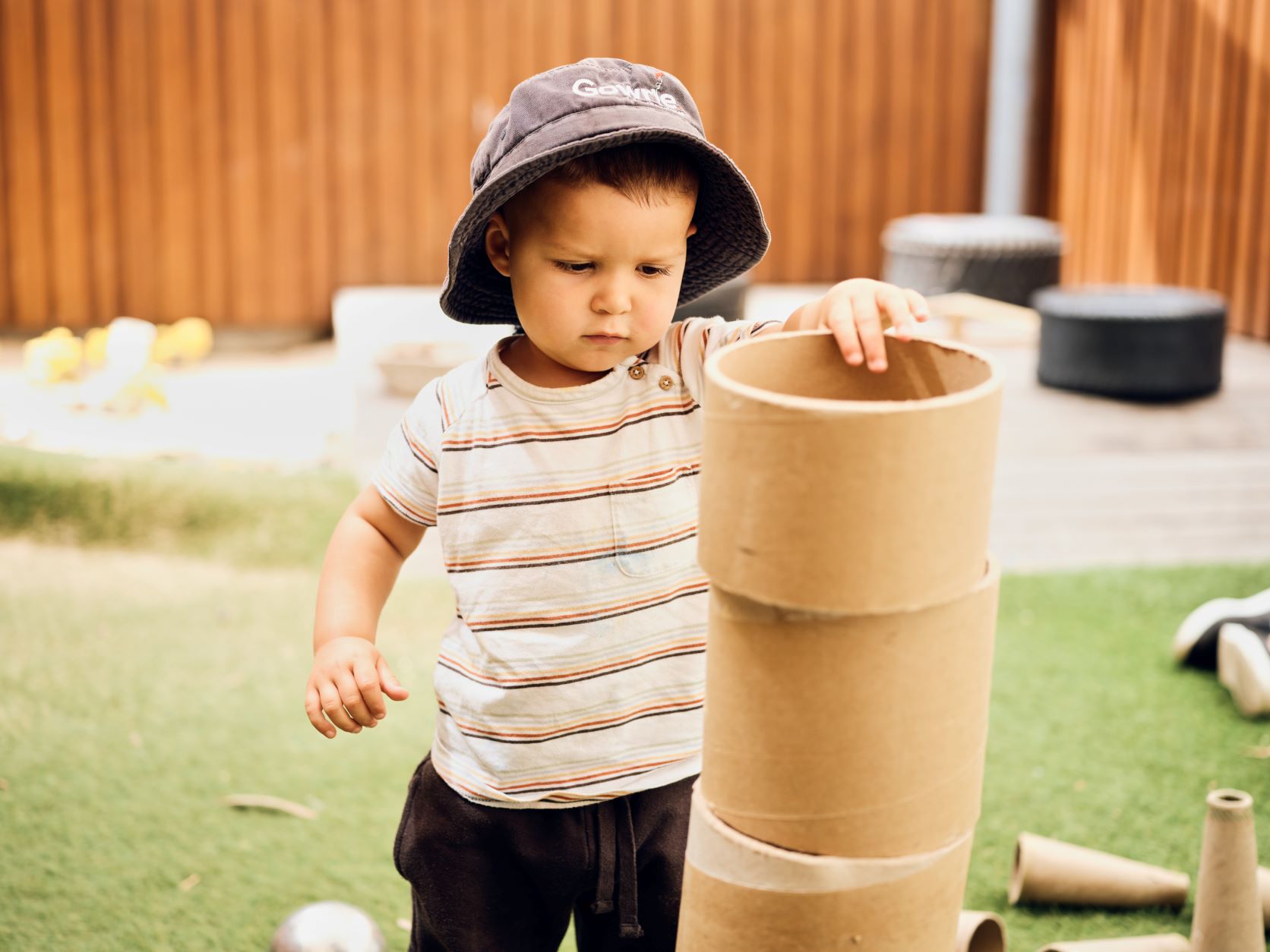
Fun Play Ideas and Games for Children
When you’re thinking about which games to play with your children, you should consider their developmental stage as well as the skills that you want to target. But don’t forgot that playing should be fun!
Here are a range of play ideas and games for different ages and stages.
Games For Babies
At this stage of development, you can have endless fun with even the simplest of games.
Babies are intrigued by faces. They study them and love when they do silly things. They like to mimic your facial expressions and will even try to have a “conversation” with you.
Throughout their first year, babies reach many different milestones. From smiling to sitting, crawling, walking and saying their first words, the games you play can help to support this and their ongoing brain development.
Peekaboo
Use your hands, a book or a towel to cover your face or a toy and then shout “Peekaboo!” as you do the big reveal. It’s like an early version of hide and seek.
It’s such a simple game but babies squeal with joy when they play it. Peekaboo helps them to
develop a secure attachment because they learn that even if you “disappear”, you always come back. It also helps them to understand how the world works.
Outdoor Play
Many of the games you play inside can also be played outside. But it’s also an opportunity to explore the natural world.
It’s amazing the difference a change of scenery and a little fresh air can make to both you and your baby.
You could take your baby for a walk in the pram. Or put a blanket down in the backyard and feel the grass or play with leaves.
Messy Play
You might not like the idea of cleaning up after messy play but your baby will love it. It’s also a good way for them to experience different sensations and textures.
Make your own finger paint at home or let your baby experiment with play dough. They could also play with cooked pasta or dig toys out of jelly.
Tummy Time
It might not seem like a super fun game but tummy time is important for baby growth and development. It helps to strengthen the muscles in their neck, shoulders, back and arms. Believe it or not, it can also support healthy brain development.
From birth, place your baby on their tummy on the floor a few times a day. Make sure they’re comfortable and safely supervised.
Avoid tummy time when your baby is hungry or tired. They may not enjoy it to start with but you can gradually build up to longer times as they build their strength.
Obstacle Course
If your baby is able to crawl, an obstacle course is a good way to challenge their motor skills.
Use pillows, toys or even a soft tunnel to create an obstacle course. Encourage them to climb over or around the objects, helping them if they need it.
Screen Time
It’s recommended that children under 2 years of age don’t have any screen time. Long periods of sitting or lying down while watching a screen can have a detrimental impact on a baby’s development.
Games For Toddlers
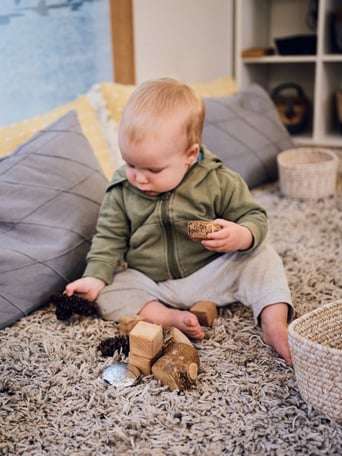 Toddlers are always on the go. They’re into everything they can get their hands on and they love to play.
Toddlers are always on the go. They’re into everything they can get their hands on and they love to play.
At this age, you have more options for different games and activities to play. Games can be more social and include other children. You can also make use of a wider range of toys and resources, like puzzles, blocks, cars, balls or dress ups.
Reading
When you’re reading with your toddler, you’re not necessarily teaching them how to read. What you are doing is giving them a love of books… which will help them learn to read when the time comes.
When you read to your child, you’re opening them up to whole new worlds. Books can spark the imagination and teach them about new cultures and experiences.
Board books and pop up books are perfect for toddlers, as are picture books and rhyming stories.
Drawing
Early toddler drawings might just look like scribbles but those scribbles are helping to develop their fine motor skills.
Eventually they will be able to draw shapes or faces and progress to much more exciting drawing subjects as they get older.
Embrace the scribble and join them in drawing - it’s good fun for adults too. Lay out the paper and pencils and away you go. One day you’ll look back on those scribbles with such fond memories.
Nursery Rhymes
When you sing nursery rhymes to or with your toddler, you’re helping them to develop important language skills. Not to mention their memory and listening skills.
Try to think of some of the nursery rhymes you sang as a child. Humpty Dumpty, Twinkle Twinkle Little Star or Incy Wincy Spider are great places to start. Sing them with your child regularly and you’ll be amazed at how quickly they learn all the words.
Messy Play
For toddlers, messy play can get really messy! But that’s all part of the fun.
How can you incorporate messy play into their routine? Try making oobleck (with cornflour and water) or letting them play with jelly. Colour spaghetti with food dye and let them make colourful, stringy artworks. Shaving cream is also a fun option to add a little food dye and make shaving cream artworks.
Outdoor Play
Time spent in the outdoors is great for the physical wellbeing of toddlers. It gives them access to a whole other world of play. Whether it’s running on the grass or playing on swings and slides, they can be physically active to work on their gross motor skills.
Outdoor play also helps toddlers to tap into their senses. You can talk to them about what they can see, hear, smell and feel.
If you don’t have a backyard, a walk to the park or even just a walk up and down your street can be just what your toddler needs.
Hide and Seek
There’s more to hide and seek than meets the eye. The person who is “it” is practising their counting skills. They also need to listen carefully and spot clues to find the people who are hiding.
If your toddler is the one doing the hiding, this may help them to alleviate separation anxiety. If you’re the one hiding it also gives you a few minutes to relax in an otherwise busy day.
Screen Time
Ideally you should limit screen time for toddlers to one hour per day or less. The best type of screen time is the educational type so pick shows or games that will help your child to learn while they’re playing.
Children learn from watching their parents so it’s also wise to role model good screen time behaviour for your toddler. This includes things like no phones at the dinner table.
Games For School Aged Children
By school age, children are much more independent. They are capable of more independent play and structured games so their play can look very different to that of a toddler.
No matter how old they get, play is still important. That even goes for grown ups!
Outdoor Play
It doesn’t matter if you’re 1 or 100, getting outside is good for you.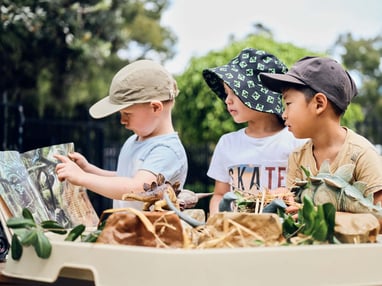
For older children, outside play allows them to explore their natural environment. They learn about how to care for their environment and can even test their physical limits with things like climbing trees.
If your child is enough for activities like organised sport, this is a good way to get them outdoors and running around. Otherwise, time in the backyard or at the local part everyday can help them to burn energy and build strong muscles.
Sound and Music Play
Music is beneficial for children of all ages. It’s often how they learn the alphabet and how to count. It can also help with their literacy and communication skills. When you add movement – such as dancing – it also helps with physical development.
Games like musical chairs or making a musical instrument can be good for children of this age. As can an activity as simple as dancing around the living room with the family.
Arts and Crafts
More than just about creative exploration, arts and crafts activities also help children to develop their fine motor skills and hand eye coordination. It can help them to identify different shapes and learn about different colours or textures.
Craft can be a planned activity whereby your child draws a particular picture or makes a particular craft. Or you can simply give them a range of different resources and see what they come up with.
Puzzles, Cards and Board Games
These types of games and activities are excellent learning tools for children. They teach taking turns, following rules, how to lose, teamwork, patience and so much more.
Puzzles are great for independent or quiet play, as are certain card games. Depending on the board game, it can also teach literacy, numeracy or science skills.
Plus, playing a board or card game or doing a puzzle together is a wonderful to spend time and connect as a family.
Screen Time
Not all screen time is bad. If you choose age-appropriate games and apps and help your child to manage their screen time, they can develop a healthy relationship with screens.
Make sure that your child is balancing their screen time with other activities. They should be playing outdoors, reading, playing with friends and all of those other types of play that is so important for kids.
What To Do If Your Child Doesn’t Want To Play Games
Sometimes, a child may be tired or simply not in the mood to play. We all have those moments. They may prefer to sit quietly by themselves for awhile and join in at another time. This is generally nothing to worry about.
However, sometimes there may be another reason behind your child’s lack of desire to engage in a game. Your child may be overwhelmed or not have the communication or other skills they need to be able to join in the game. They may not have the attention span required for the particular game
At any time, if you’re concerned, you can always speak with your child’s educator or health professional. They can work out if there is an underlying cause or give you strategies to support your child as they learn to play.
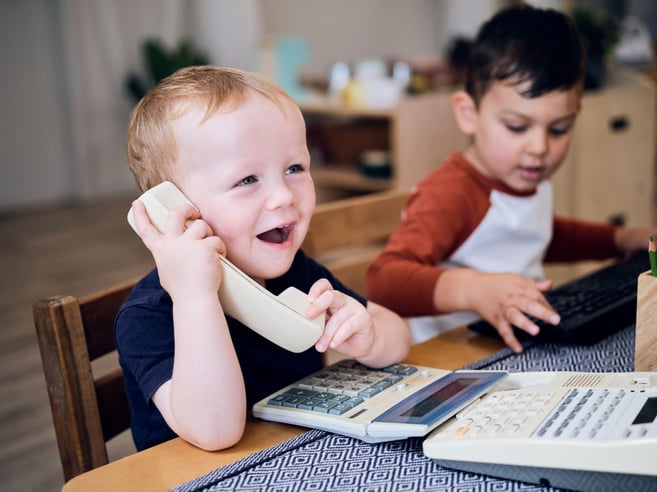
Tips to Encourage Children to Play
While it’s a fun part of childhood, play doesn’t always come easily to every child. Sometimes they need a little help to encourage them to take that next step to play.
Here are some tips:
- Make sure that the game or activity is developmentally appropriate for your child. If it’s too advanced for them, they will struggle and not enjoy the experience.
- Start with activities that they enjoy. This may help to ease them into other types of play down the track.
- Praise your child when they engage in the play so they are encouraged to keep playing.
- Be flexible with the game. If it doesn’t pan out how you were planning, that’s not necessarily a bad thing. Go with the flow and let your child lead the way.
- Break up activities with free or unstructured play.
Newborns and Babies
For newborns and really little ones, play is simple. A tickle of the toes, placing a block just out of reach for them to grab or singing a song can be just what they need.
Toddlers
Toddlers and preschoolers are busier so they might need more toys or props to play with. They love colours, movement and tapping into their amazing imaginations. Give them a range of different resources – such as old containers, scarves, pillows or pots and pans – and see what happens.
School Aged Children
Given their higher levels of independence, school aged children can often lead their own play. Give them access to a craft box or items for loose parts play and that could spark their own play ideas. At this age you can also enjoy cooking together or doing science experiments that will help them learn and play at the same time.
Everyday is a fun adventure at Gowrie NSW
We’re here to support you with a range of parent and family resources that you can find on our website. Our early education and care centres are full of fun and play, tied to the curriculum. We nurture each child in a caring environment so they can discover their full potential.
Contact us to discuss our approach and how we can support your child in their early years.
Published 7th July 2022






